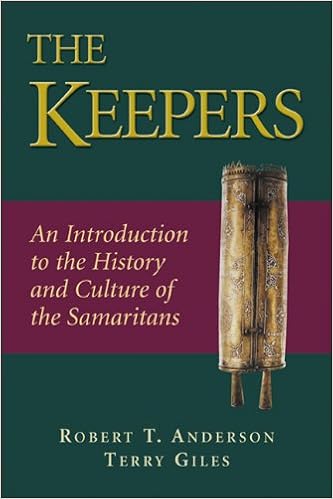This short introduction to Samaritan history and culture takes its reason for being from a collection of materials available at Michigan State University. The authors spend a couple of chapters on this collection, which is likely of interest to a few very devoted to these studies but which was not the heart of why I turned to this work. The reason I turned to this work was that I wanted a relatively short synopsis of Samaritan history, religion, and culture--and that, in its middle chapters, was exactly what this book supplied.
The Samaritans we know in scripture are a people despised by the Jewish people. Josephus and Kings essentially tell us that they consist of people injected into the land of Israel, the northern kingdom, after the Assyrians deported the northern ten tribes. Those people took on Jewish customs, after begging for a priest from the land, and merged them with their own. That's the story from the Jewish perspective.
The story from the Samaritan perspective is quite different. In their view, they stem from a conflict over the high priesthood that occurred shortly after Phinehas's demise. Eli, the son of Yafni tried to usurp the sons of Phinehas (Ozzi being high priest at the time). Eli's group moved to Shiloh and then eventually Jerusalem. Ozzi's group stayed at Shechem and Mount Gerizim, the original holy place.
Historical records of the sect begin to show up around the time that the Jewish people return from captivity in Babylon. Ezra, in shaping the Jewish scriptures, allowed in books beyond the Pentateuch, the first five books of the Bible, and he condemned marriages between Jews and Samaritans, considering the latter essentially akin to Gentiles (though this tradition is largely an interpretation of Josephus--the biblical record does not explicitly mention the Samaritans in this context). Another thing Ezra did was promote Jerusalem as the center of worship.
It is when the Greeks take over the Promised Land that Samaritan consciousness really takes hold, and the sect enters history in its own light. Their separation from Judaism also becomes plain, as for example, the Maccabees rebel but the Samaritans do not, the latter not being considered of the same religion as the Maccabees. John Hyrcanus's attack on the group cemented their separation.
While the Jews and Samaritans did not get along during much of the early Roman period, the condition of the sect appears to have been one of general persecution throughout history, no matter which set of people were in charge. In the Christian era (after Constantine made Christianity the favored religion), Samaritans briefly had a respite in how they were treated because of Christian ideas about the "good Samaritan," but eventually they were blamed for gnosticism and persecuted by the Byzantines. When the Muslims took over, once again, there was a brief respite, until the Muslims decided that Samaritans did not qualify as "people of the book," unlike Jews and Christians, at which time they were taxed extra.
Today, Samaritans are often considered a sect of Judaism. Like followers of Judaism, they believe in circumcision, the keeping of the Sabbath, the biblical holy days, and the first five books of the Bible. However, they see Gerizim as the center of God's holy realm rather than Jerusalem and attach various biblical events to it just as Jews attach various biblical events to Jerusalem. They do not accept the rest of the Old Testament as scripture, and they have commentaries and other books (not considered part of their scriptures) that continue their story into Joshua's time. Their Pentateuch, while similar to the Jewish one, makes certain substitutions with regard to Gerizim as a place; it also is apparently closer to the Septuagint than to the Masoretic text. They believe in a Messiah to come, though he is seen primarily as a physical leader. They also, to this day, offer sacrifices. And the biblical holy days, finally, are on their own calendar separate from the Jewish calendar, the calculation of which only the priests know; thus Passover and the like may be celebrated at a slightly different time than it is in mainstream Judaism. They do not keep other Jewish days, such a Hanukkah or Purim.
Monday, April 9, 2018
On "The Keepers" by Robert T. Anderson and Terry Giles ***
Subscribe to:
Post Comments (Atom)







No comments:
Post a Comment